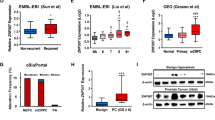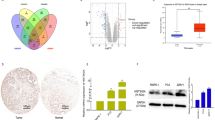Abstract
NKX3.1, a prostate-specific gene, plays an important role in prostate development and carcinogenesis. However, its precise function has not been established. In present study, we transfected the NKX3.1 eukaryotic expression plasmid (pcDNA3.1-NKX3.1) into human prostate cancer cells PC-3, which lack of NKX3.1 expression, and established stable transfectants. Then, we investigated the influence of NKX3.1 on the cell growth, cell migration and colony formation efficiency. The results showed that restoration of NKX3.1 expression inhibited proliferation and invasion activities of PC-3 cells. Further, a cDNA microarray containing 22,000 human genes was used to identify the gene expression differences. The results showed that there were 1,953 genes showing more than a two-fold difference in expression. Subsequent ontological analysis revealed that a large proportion of the classified genes were related to cell growth, cell signal and cell invasion. Finally, the expression of Caspase-3, Bcl-2, P27, Cdk6 and AMACR, randomly selected genes from microarray data, was validated by RT-PCR and western blot. Collectively, our results first analyzed the gene expression profile in PC-3 cells induced by NKX3.1 and indicated that NKX3.1 might exert its function by regulating the expression of relative genes.





Similar content being viewed by others
References
Bieberich CJ, Fujita K, He WW (1996) Prostate-specific and androgen-dependent expression of a novel homeobox gene. J Biol Chem 13;271(50):31779–31782
Bhatia-Gaur R, Donjacour AA, Sciavolino PJ et al (1999) Roles for Nkx3.1 in prostate development and cancer. Genes Dev 13:966–977. doi:10.1101/gad.13.8.966
Tanaka M, Komuro I, Inagaki H et al (2000) Nkx3.1, a murine homolog of Drosophila bagpipe, regulates epithelial ductal branching and proliferation of the prostate and palatine glands. Dev Dyn 219(2):248–260. doi:10.1002/1097-0177(2000)9999:9999<::AID-DVDY1054>3.3.CO;2-5
Kim MJ, Bhatia-Gaur R, Banach-Petrosky WA et al (2002) Nkx3.1 mutant mice recapitulate early stages of prostate carcinogenesis. Cancer Res 62(11):2999–3004
Shen MM, Abate-Shen C (2003) Roles of the Nkx3.1 homeobox gene in prostate organogenesis and carcinogenesis. Dev Dyn 228(4):767–778. doi:10.1002/dvdy.10397
Abdulkadir SA, Magee JA, Peters TJ et al (2002) Conditional loss of Nkx3.1 in adult mice induces prostatic intraepithelial neoplasia. Mol Cell Biol 22(5):1495–1503. doi:10.1128/MCB.22.5.1495-1503.2002
Cher ML, Bova GS, Moore DH et al (1996) Genetic alterations in untreated metastases and androgen-independent prostate cancer detected by comparative genomic hybridization and allelotyping. Cancer Res 56(13):3091–3102
Vocke CD, Pozzatti RO, Bostwick DG et al (1996) Analysis of 99 microdissected prostate carcinomas reveals a high frequency of allelic loss on chromosome 8p12–21. Cancer Res 56(10):2411–2416
Dong JT (2001) Chromosomal deletions and tumor suppressor genes in prostate cancer. Cancer Metastasis Rev 20(3–4):173–193. doi:10.1023/A:1015575125780 Review
Asatiani E, Huang WX, Wang A et al (2005) Deletion, methylation, and expression of the NKX3.1 suppressor gene in primary human prostate cancer. Cancer Res 65(4):1164–1173. doi:10.1158/0008-5472.CAN-04-2688
He WW, Sciavolino PJ, Wing J et al (1997) A novel human prostate-specific, androgen-regulated homeobox gene (Nkx3.1) that maps to 8p21, a region frequently deletion in prostate cancer. Genomics 43:69–77. doi:10.1006/geno.1997.4715
Bowen C, Bubendorf L, Voeller HJ et al (2000) Loss of NKX3.1 expression in human prostate cancers correlates with tumor progression. Cancer Res 60:6111–6115
Xu LL, Srikantan V, Sesterhenn IA et al (2000) Expression profile of an androgen regulated prostate specific homeobox gene NKX3.1 in primary prostate cancer. J Urol 163(3):972–979. doi:10.1016/S0022-5347(05)67867-6
Aslan G, Irer B, Tuna B et al (2006) Analysis of NKX3.1 expression in prostate cancer tissues and correlation with clinicopathologic features. Pathol Res Pract 202(2):93–98. doi:10.1016/j.prp.2005.11.007
Liu W, Zhang P, Chen W et al (2008) Characterization of two functional NKX3.1 binding sites upstream of the PCAN1 gene that are involved in the positive regulation of PCAN1 gene transcription. BMC Mol Biol 9:45. doi:10.1186/1471-2199-9-45
Chen H, Nandi AK, Li X et al (2002) NKX-3.1 interacts with prostate-derived Ets factor and regulates the activity of the PSA promoter. Cancer Res 62(2):338–340
Dudoit S, Yang YH, Callow MJ et al (2002) Statistical method for identifying genes with differential expression in replicated cDNA microarray experiments. Stat Sin 5:111–139
Dennis G Jr, Sherman BT, Hosack DA et al (2003) DAVID: database for annotation, visualization, and integrated discovery. Genome Biol 4:3. doi:10.1186/gb-2003-4-5-p3
David JS, Domenica G, Edward PG (2000) DNA-binding sequence of the human prostate-specific homeodomain protein NKX3.1. Nucleic Acids Res 28:2389–2395. doi:10.1093/nar/28.12.2389
Muhr J, Andersson E, Persson M et al (2001) Grouchomediated transcriptional repression establishes progenitor cell pattern and neuronal fatein the ventral neural tube. Cell 104:861–873. doi:10.1016/S0092-8674(01)00283-5
Choi CY, Kim YH, Kwon HJ et al (1999) The homeodomain protein NK-3 recruits Groucho and a histone deacetylase complex to repress transcription. J Biol Chem 274:33194–33197. doi:10.1074/jbc.274.47.33194
Carson JA, Fillmore RA, Schwartz RJ et al (2000) The smooth muscle gamma-actin gene promoter is a molecular target for the mouse bagpipe homologue, mNkx3–1, and serum response factor. J Biol Chem 275:39061–39072. doi:10.1074/jbc.M006532200
Nishida W, Nakamura M, Mori S, Takahashi M et al (2002) A triad of serum response factor and the GATA and NK families governs the transcription of smooth and cardiac muscle genes. J Biol Chem 277:7308–7317. doi:10.1074/jbc.M111824200
Aberle H, Schwartz H, Kemler R (1996) Cadherinecatenin complex: protein interactions and their implications for cadherin function. J Cell Biochem 61:514–523. doi:10.1002/(SICI)1097-4644(19960616)61:4<514::AID-JCB4>3.0.CO;2-R
Conacci-Sorrell M, Zhurinsky J, Ben-Ze’ev A (2002) The cadherinecatenin adhesion system in signaling and cancer. J Clin Invest 109:987–991
Wodarz A, Nusse R (1998) Mechanisms of Wnt signaling in development. Annu Rev Cell Dev Biol 14:59–88. doi:10.1146/annurev.cellbio.14.1.59
Katoh M (2001) Frequent up-regulation of WNT2 in primary gastric cancer and colorectal cancer. Int J Oncol 19:1003–1007
Chen G, Shukeir N, Potti A et al (2004) Upregulation of Wnt-1 and beta-catenin production in patients with advanced metastatic prostate carcinoma: potential pathogenetic and prognostic implications. Cancer 101:1345–1356. doi:10.1002/cncr.20518
Glinsky GV, Glinskii AB, Stephenson AJ et al (2004) Gene expression profiling predicts clinical outcome of prostate cancer. J Clin Invest 113:806–808
Chesire DR, Ewing CM, Sauvageot J et al (2000) Detection and analysis of beta-catenin mutations in prostate cancer. Prostate 45(4):323–334. doi:10.1002/1097-0045(20001201)45:4<323::AID-PROS7>3.0.CO;2-W
Chesire DR, Ewing CM, Gage WR et al (2002) In vitro evidence for complex modes of nuclear beta-catenin signaling during prostate growth and tumorigenesis. Oncogene 21(17):2679–2694. doi:10.1038/sj.onc.1205352
Acknowledgments
This study was supported by the Natural Science Foundation of Shandong Province (No.Y2007C96 and No.Y2005C03) and the National Natural Science Foundation of China (No. 30870732 and No. 30670581)
Author information
Authors and Affiliations
Corresponding authors
Rights and permissions
About this article
Cite this article
Zhang, P., Liu, W., Zhang, J. et al. Gene expression profiles in the PC-3 human prostate cancer cells induced by NKX3.1. Mol Biol Rep 37, 1505–1512 (2010). https://doi.org/10.1007/s11033-009-9549-8
Received:
Accepted:
Published:
Issue Date:
DOI: https://doi.org/10.1007/s11033-009-9549-8




